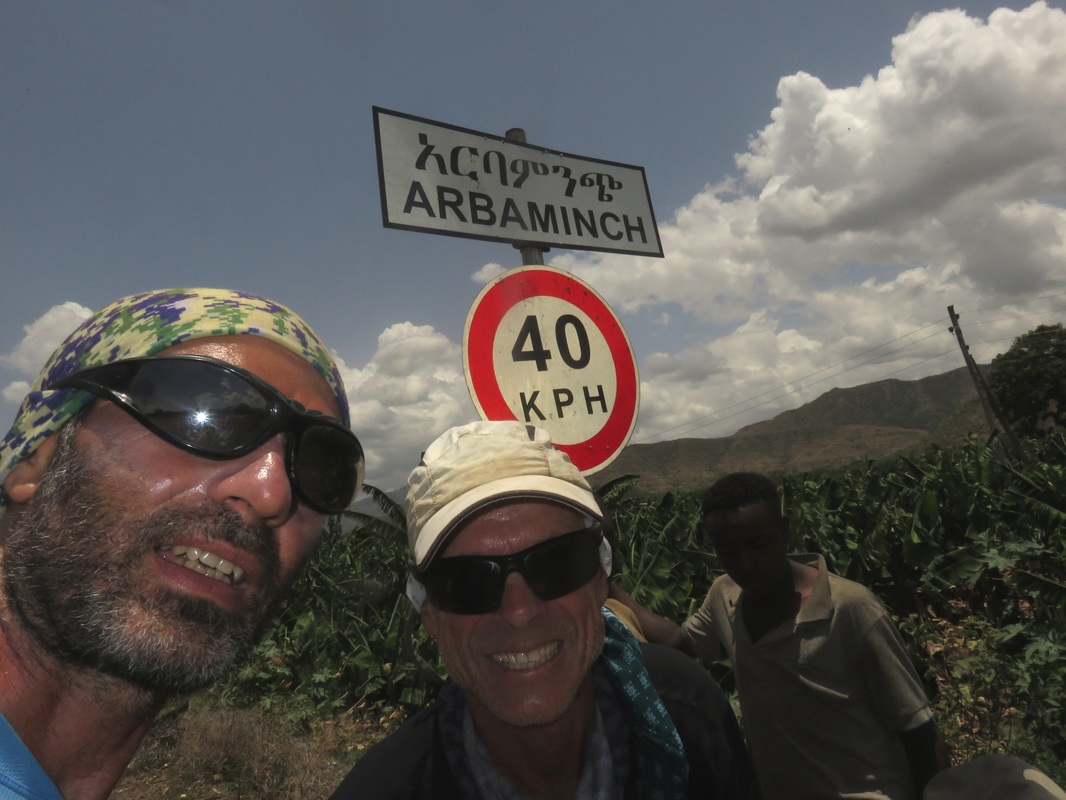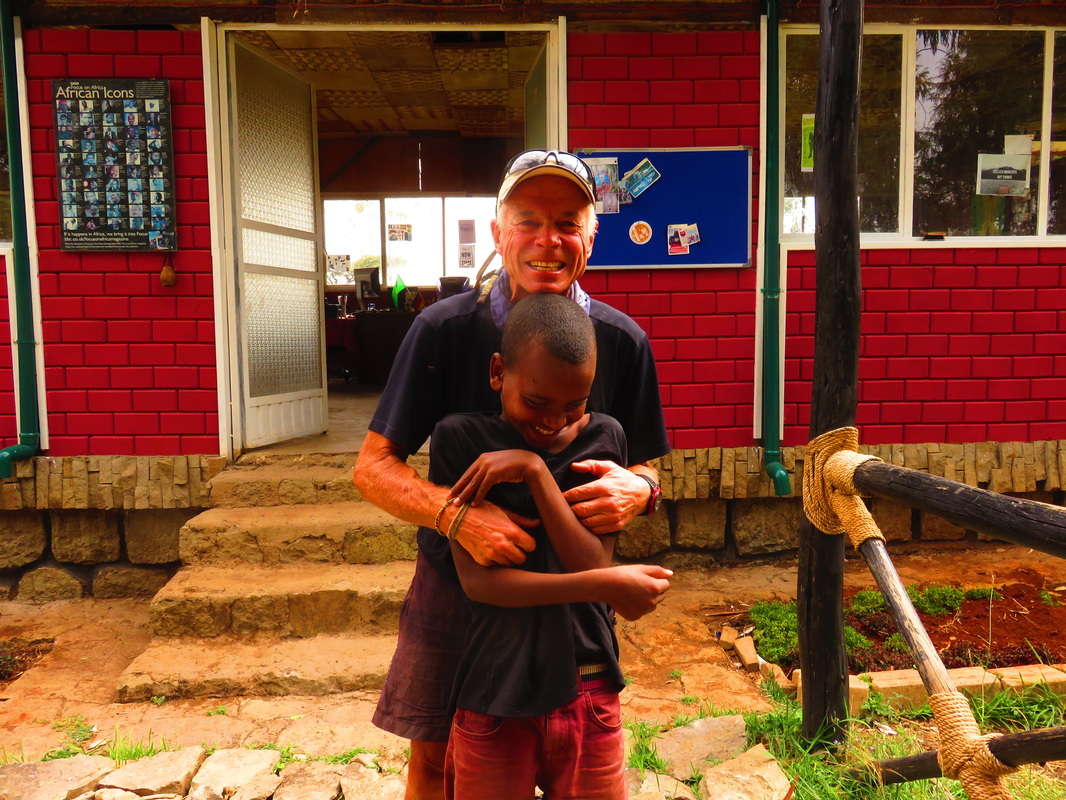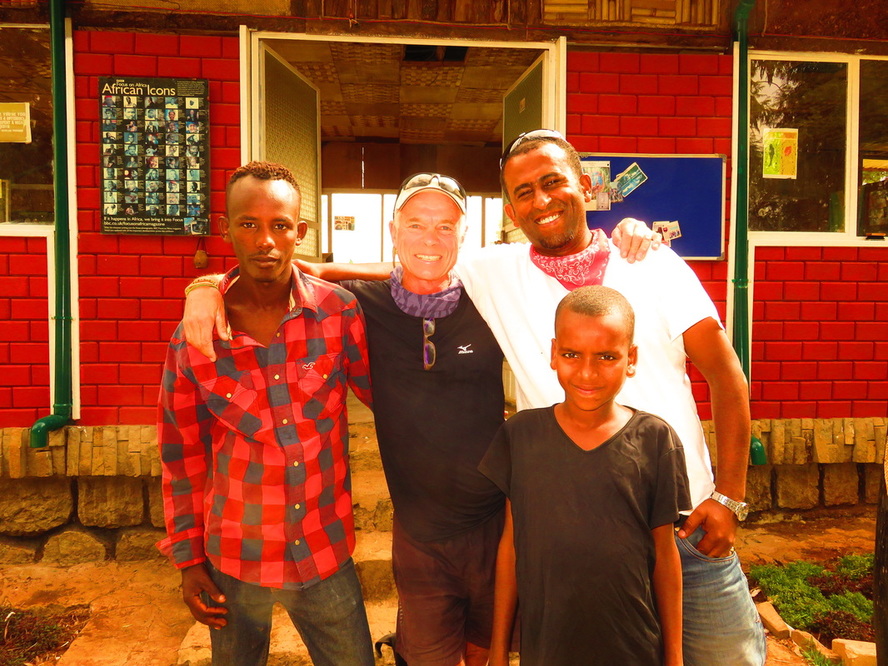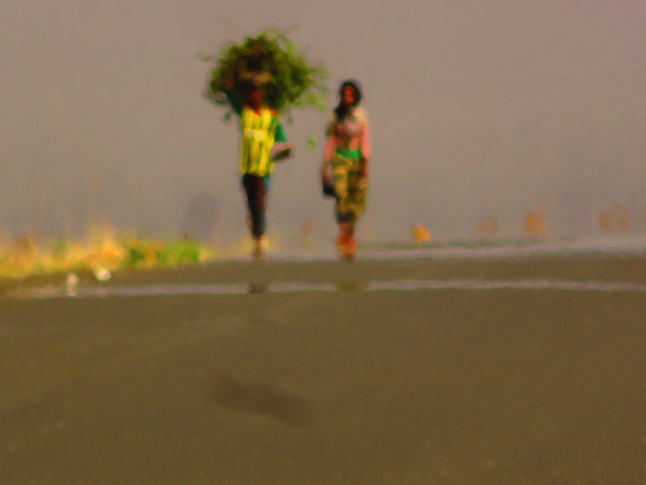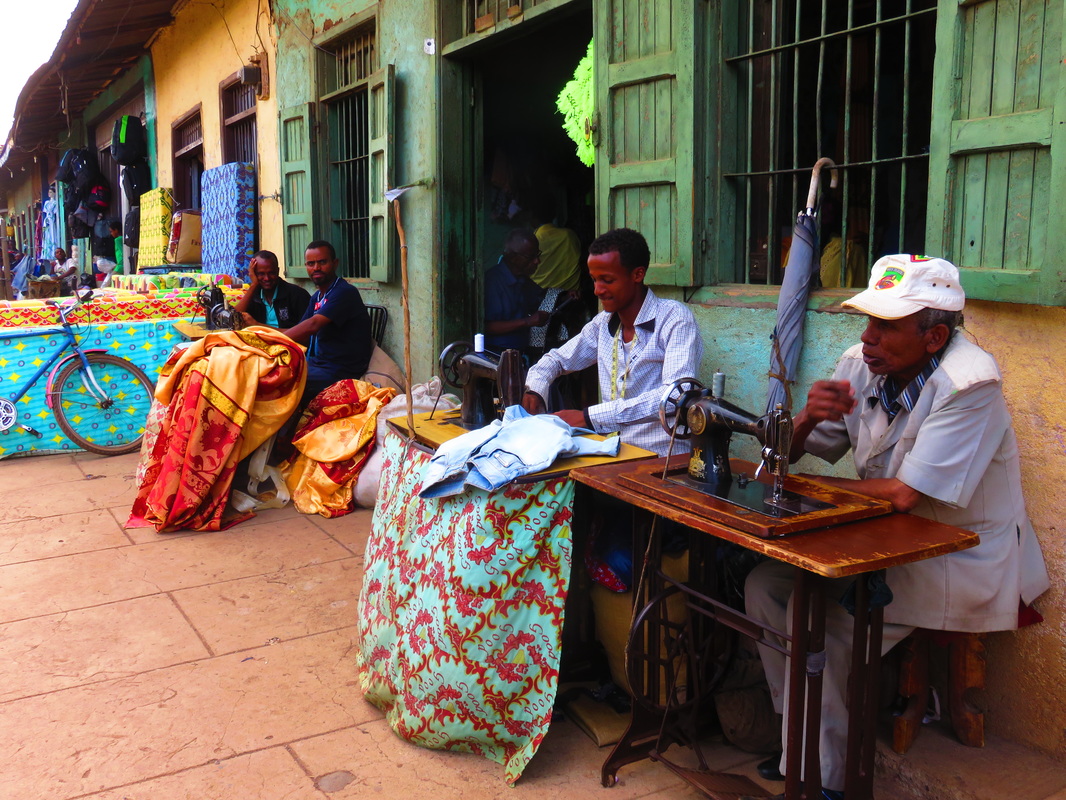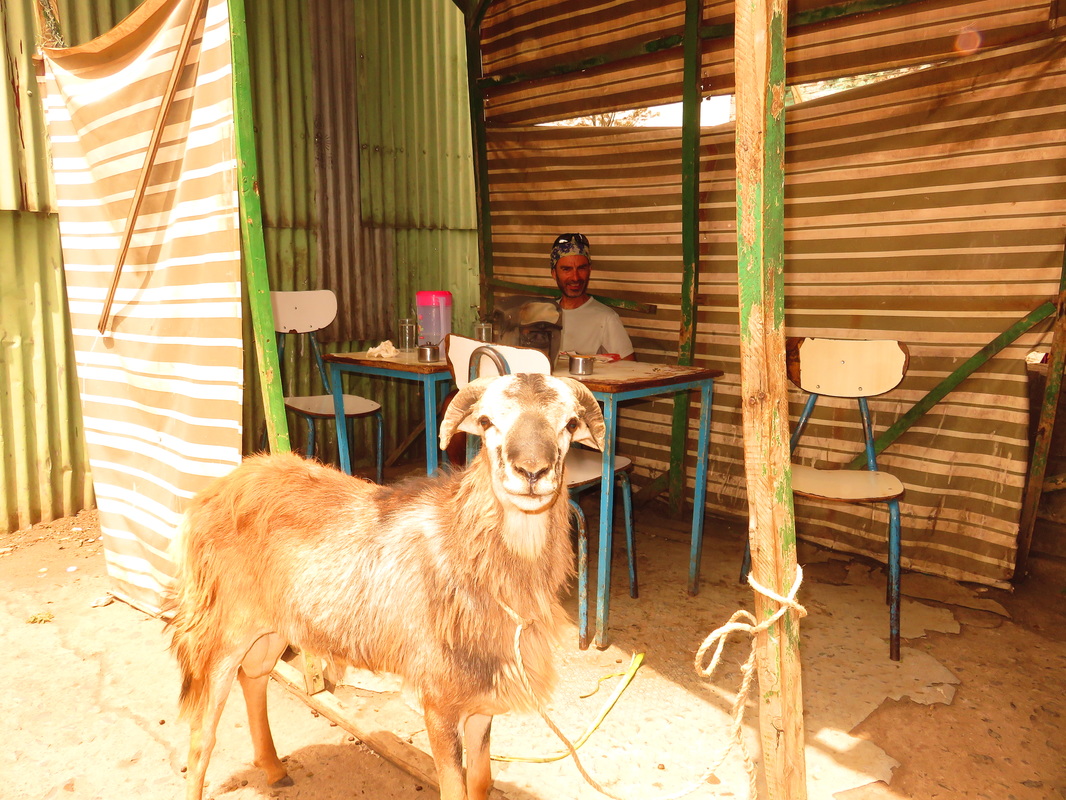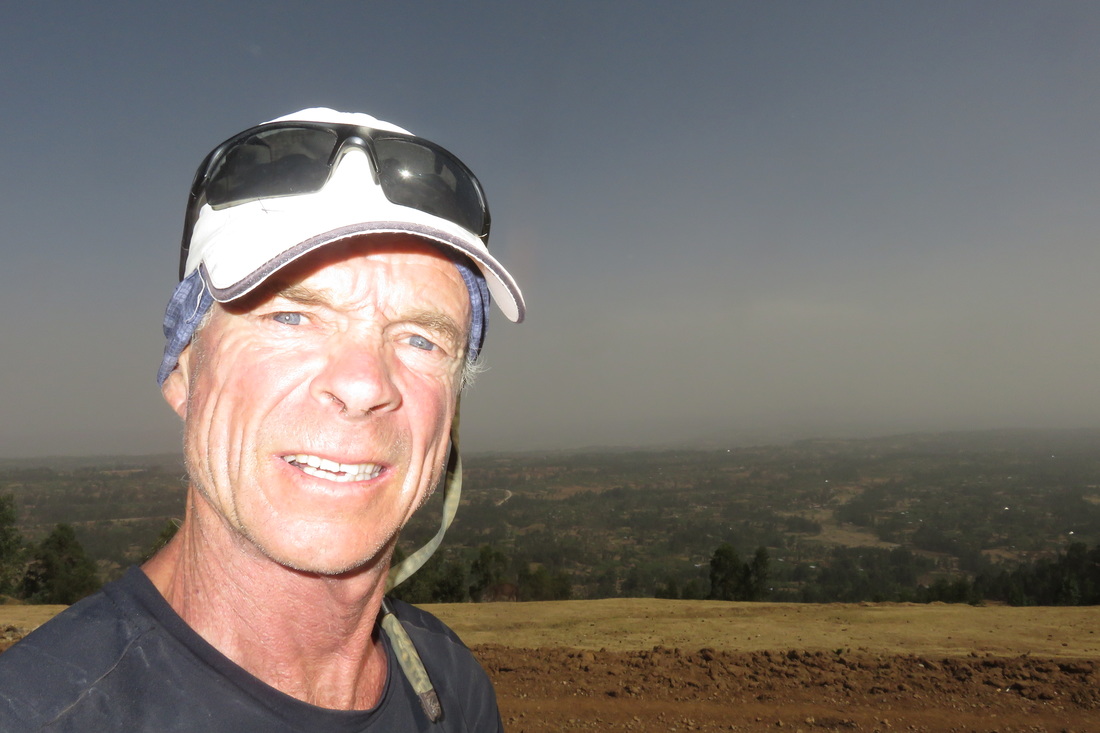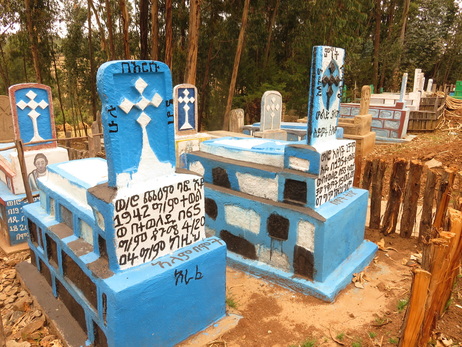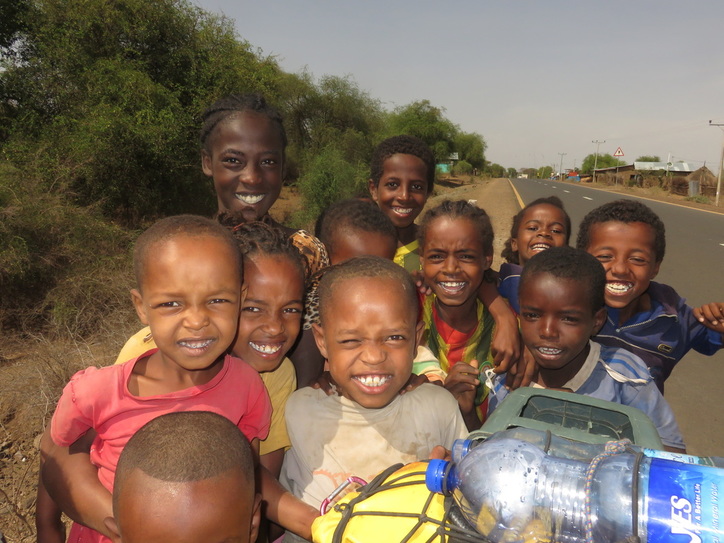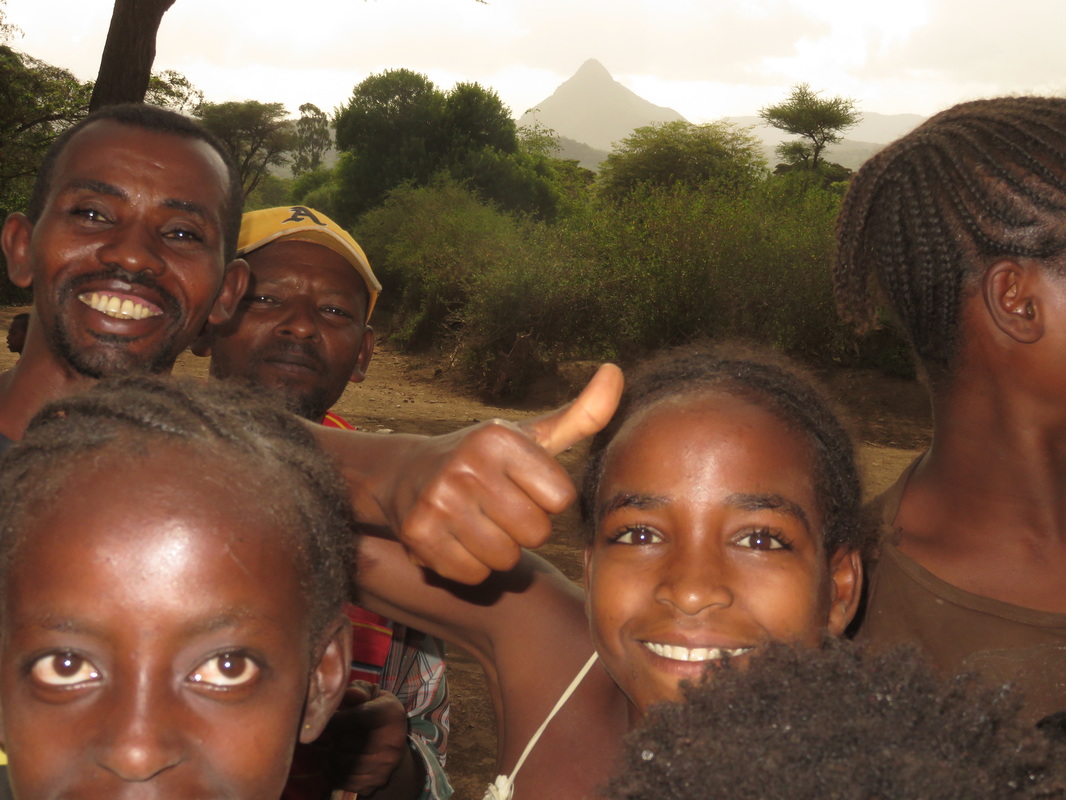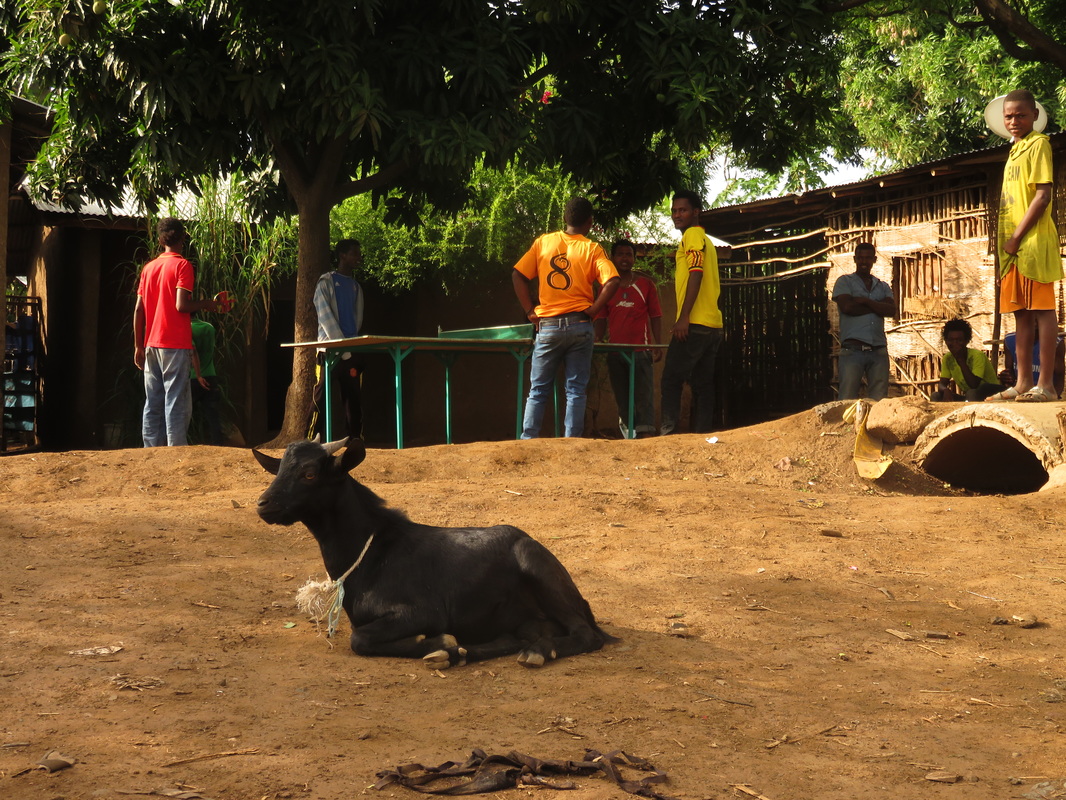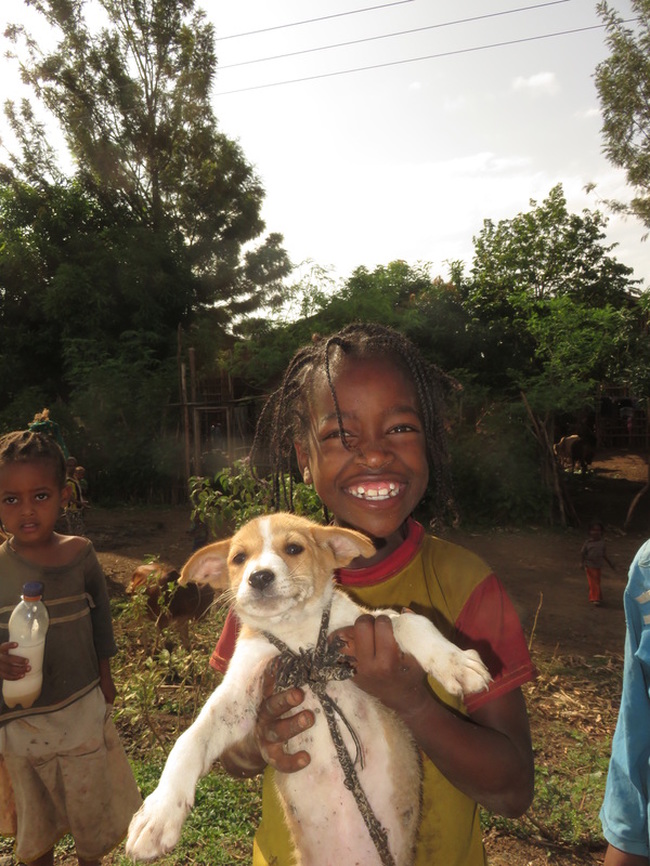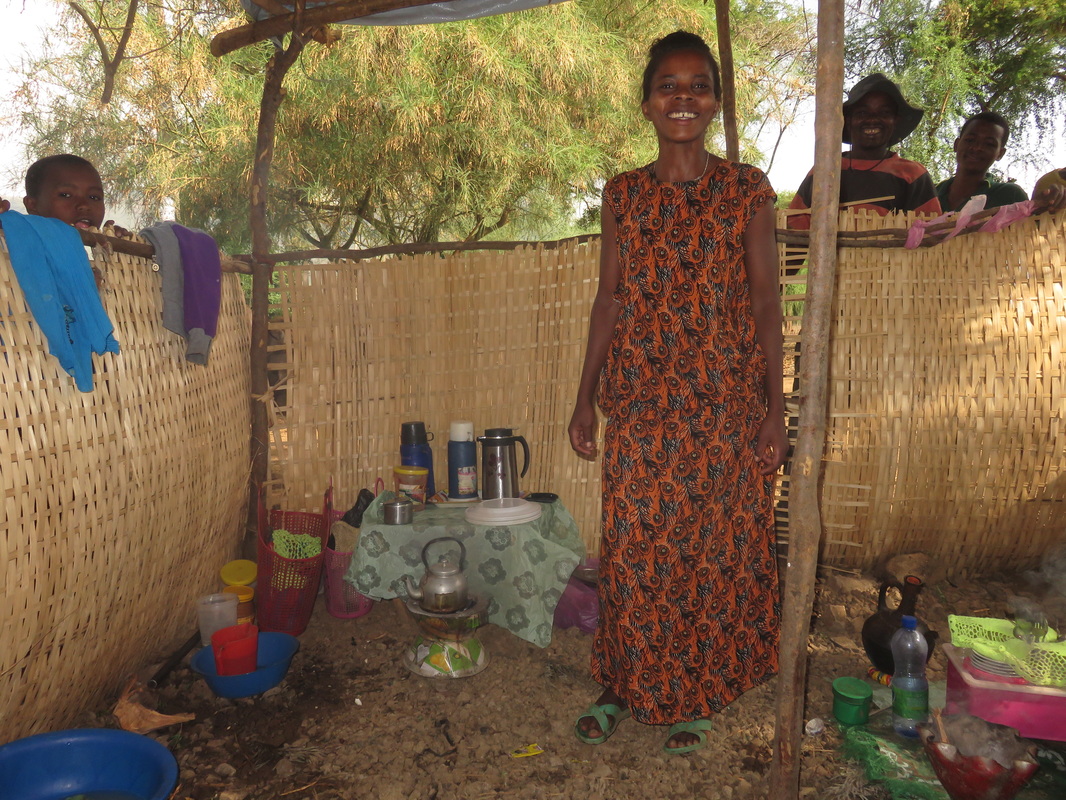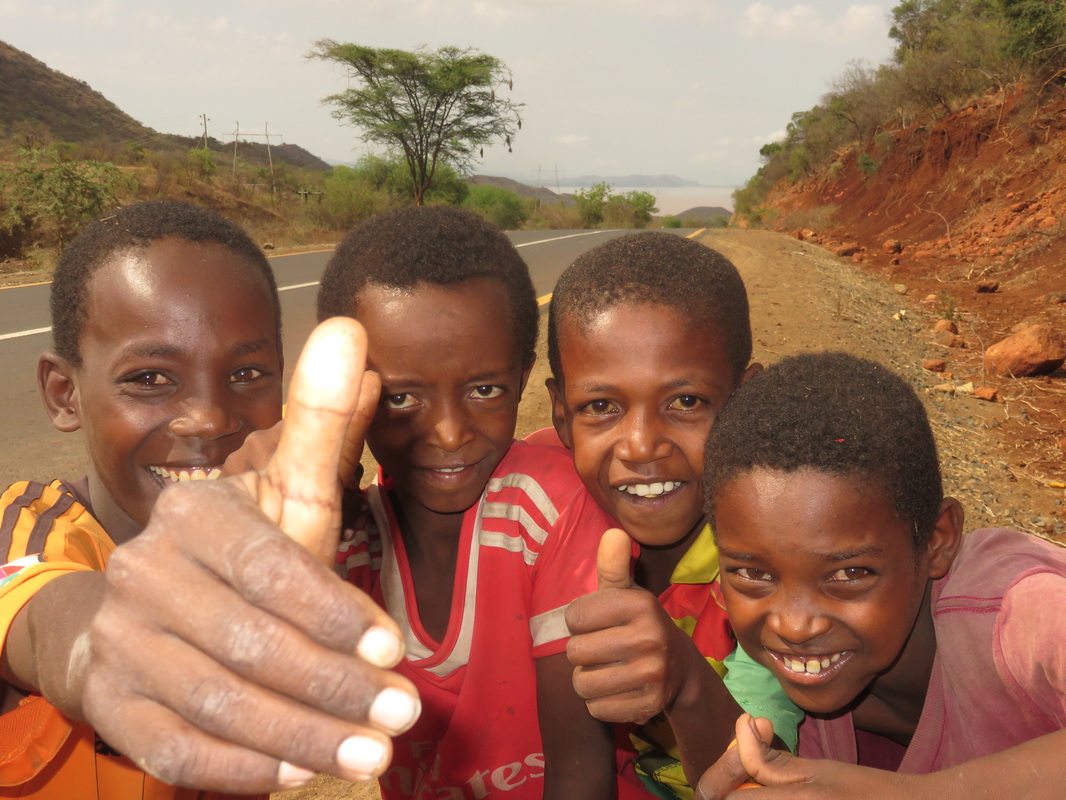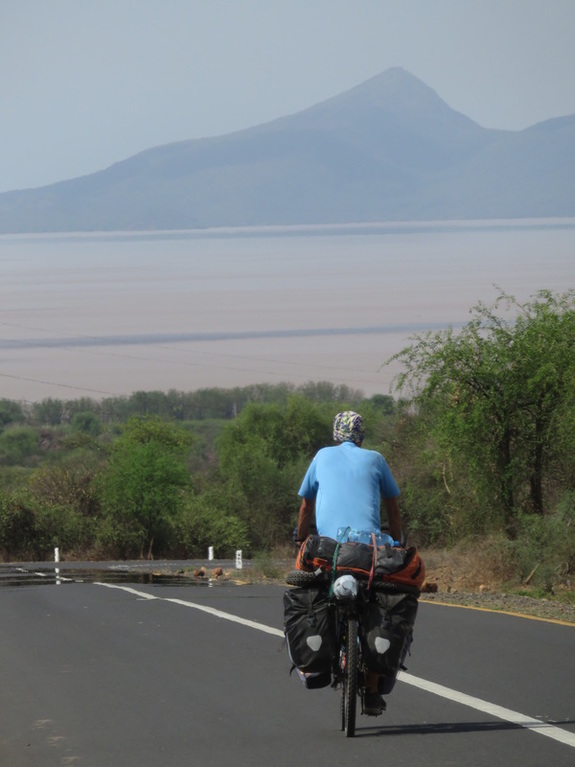5/4/2015 Waliso to Endibir
D75, T4.45, Av15.81, Max58 , 39,320, 4,319
Mostly downhill till the river crossing after Wilkite
Warm cloudy day some NE wind
The time had arrived to leave Wakos, we could have stayed for a few more days, he made us feel that welcome. I felt like part of the family while here.
Anita, a young woman from Iceland came down from Addis and spent the night with us.
We all wandered down to the Negash Resort and had one of their hot showers. Again, it was great to be sparkling clean.
Talkng to my friend Pauline in Nicaragua, she informed me my sleeping bag turned up in the post, five months later. They would not release it due to her having no ID of mine. They have sent it back to Australia. I wonder how long that trip takes?
Our last night was spent around a campfire talking.
We got away from Wakos about 1000. We both felt unbelievably refreshed and relaxed. The ride all the way to Welkite was pretty much downhill. People were reasonably friendly on the road. The “you you” and “give me money” calls were few.
In Welkite, we found a Muslim restaurant and sat down outside and enjoyed a meal of beef, it was basic, just lightly fried beef pieces with onion and white bread, it filled a spot.
Next to our outdoor table was a goat tied up waiting to be slaughtered in the next day or two.
The Muslim restaurants are great during the time when the OC’s are fasting. They always have colourful vinyl prints showing cows, goats and sheep. Often the give away is the animal tied up outside. There is always a butcher shop in the front.
Here I refilled my MSR stove bottle, I had given the fuel bought in Waliso to Wako.
It was black market petrol and had been thinned with kerosene, the Tuk Tuks use it.
In the stove it would not prime properly and left soot everywhere. Whilst in Waliso, a litre of 97% alcohol was bought for priming the stove. This is important to keep the stove free of the black soot that priming with petrol creates .
From Welkite we turned left to head across to the main road and south to Abra Minche.
This took us down to a river then back up through rolling country.
Roadworks were underway at each creek and river crossing. Almost all construction trucks and other equipment seen is of Chinese origin.
We were trying to get to Endibir, here there were hotels. Nearing the town, women in groups were seen walking along the side of the road. They were all carrying loads of sugarcane and other heavy food items like grain. Many were middle aged. They were a happy lot always chatting and never hesitated to say hello.
All along this road today, there were new houses under construction. Most were built using Eucalypt pole walls, filled with adobe and had corrugated iron roofs with high ceilings.
As we had descended all day, the temperature had warmed up. It was now quite hot. Though overcast, the UV was high, my ears got a bit burnt.
We got into Endibir about 1530 and booked the first hotel on the left as you ride into town. It was comfortable and had a bar with a restaurant.
Pedro took a bucket shower and told me the water was very cold. I opted for a swab down with my handlebar towel.
We had pasta and a beer for dinner.
As yet this area is malaria free, so we took no precautions against the odd mosquito.
Seventy five km after a week off left me very tired and relaxed. I tried to watch a movie but just could not do it.
Wako and I had swapped a lot of music and movies.
It was nice to be back on the road again.
6/4/2015 Endibir to Lera
D72, T5.45, Av12.41, Max68 , 39,393, 4,391
28km up to 3050m, 15km down to Lera
Hot, cooler on tops
We were on the rod nice and early at 0800. On the way out of town I met Peace Corp guy who was 1 year into a 2 year posting in Endibir. He was working in a school.
Once out of town a steady climb began. Most of the housing now was large Tukuls. Many with small chimneys in the peak. The country even had a colour of green about it.
The people up here were friendly and very few asked for anything.
Once again, the Eucalypts played a huge role in people’s lives. All had been coppiced and people were now cutting down the regrowth to make construction poles.
We stopped at a couple of small stalls and bought peanuts and biscuits. No one had refrigerators so for me buying drinks was kept to a minimum.
A stop was made at a village for pasta. Our cheapest yet at 6 birr each.
The climb levelled out and we forund ourselves in rolling hill country all around 3000m.
The people up here instead of wearing Congos are now wearing full plastic shoes, obviously to keep their feet warm and dry.
In a reasonable size village we hunted out a Muslim restaurant and sat down to a meat dish, very basic but nice.
We were both wornout, I fell asleep at the table for a short time. As always, our bikes are parked in full view.
Each time my bar bag, camera and knife are taken off the bike.
Often we have to tell people to move aside so we can always see the bikes.
The young children really are like flies. Older people with sticks will shoo them away and within 2 minutes they slowly drift bake around us.
I call them “Niñito mosquitos”.
From here we kept on in the rolling country and descending a bit.
At 1630 another descent began on a piece of road that was still under construction by a Yemenis company. They were using all European and Japanese gear, Iveco trucks and Komatsu dozers.
One new Iveco dump truck was seen tipped on its side in a village. The last climb back to 300m saw us both doing it very tough . It was on a piece of road still under construction, the dust was thick.
Speaking to the owner of the contracting firm near the top, he said it was 15km down to the village of Lera. He told us of a pension there.
This road connecting route 7 & 9, or between Welkite and Hosaina has just been recently asphalted, they are still working on it in places. The surface has been great all day.
So the day had two ascents with rolling hills in the middle and a 15km run down at the end to Lera, where we would never have found the pension had we not been told about it.
Pedro took a cold bucket shower, I boiled some water and had a hot swab down in my Ortlieb folding bowl.
It was quite cool up here. Having a cold shower I feel is a good way to catch a cold, especially after sweating alot of the day. The towel down makes me feel fresh.
Dinner in the blacked out town was pasta again.
7/4/2015 Lera to Areka
D94, T7, Av17, Max68 , 39,393, 4,486
Almost all downhill except for a small climb around Goyogena
Very hot and humid at the end of the day
We both had trouble with things crawling over us in our beds last night. I didn’t get bitten, though they were enough to wake me up.
Up early as usual, help was given to a guy trying to get an old Hilux going, we were successful, just as the battery was near not having enough power to crank the engine.
We were on the road by 0800.
It was a pleasure riding gently downhill. There was nowhere else at the time I would have rather been, it was bliss in the coolish morning air taking in the rural scenery.
Soon we got to Hosaina, wow what a dramatic change. People were everywhere and the “money, money”, where you go, Farangi, you you started.
We had it so good the last few weeks.
People were yelling at us. Putting their hands out, running after us, and touching the bikes.
Once out of town the same continued, the road was just a sea of humanity for most of the day.
On the big descent at speeds of nearly 70km/hr, concentration was at maximum. All the animals and people were at least predictable in their actions, for the most part.
We stopped on the roadside for a quick bite, luckily, the spot was very rural and only the land owner and few people spotted us.
Once over the climb we got Doyogena. This town was absolutely bizarre. We would park the bikes and 60 to 80 people would crowd around. They followed us whilst we were looking for a restaurant. We went into a fenced hotel. Pedro thought the prices were too expensive. Earlier he had been chasing kids away from touching the bikes.
There were no other restaurants. He didn’t like the town and said he was going to go on. I just wanted to eat in peace, so I went back to the hotel and ordered a great omelette.
An American woman came up and joined me, Melody was a member of the US Peace Corps. We had a great chat together. We then went back to her house and had continued discussing life here in Ethiopia. She was on a two year stint. She told me of the Peace Corp malaria treatment for its team.
Even after a year here she still finds it trying at times. She gets into Addis to have fun with her colleagues, there are 60 in her group. She gets $150 a month to live off.
We said goodbye and I headed off up the hill.
Coming down the other side my peak hat blew off at high speed. A taxi van saw it happen.
When I caught up to Pedro, the guys in the van pointed at their heads and Pedro got the impression I had come off the bike, he tried to ring me, we laughed.
Once over this small climb it was all downhill.
I descended quite fast, dodging all the foot traffic on the road. People were everywhere, all the way to Areka.
Many were really cheeky, raising sticks and pretending to throw stones and always asking where you go and give me money.
It really was quite disturbing at times.
Though rising above all these negative gestures were some great gestures, once again from the woman and men.
There were some very attractive middle aged woman walking along the road. Mostly in groups.
The thought occurred to me, that had these woman led lives like our own and had not had half a dozen kids. They would be even more attractive. Their figures would be the envy of most western woman. All had fine ankles, nice legs of what could be seen. Their facial expressions were those of strong character, smeered in subtle but raw beauty. All this after carting heavy loads along the road almost every day since childhood, one could safely assume.
These women had a great sense of humour and always returned greetings with a smile and sincerity.
Once in Areka we started looking for hotels the first one was even too dirty for us Pedro said on his return to the bikes. By this time I had at least a 100 people around me. Pedro could hardly see me.
We moved on up the road and found the Selam hotel. It was great, we had rooms that gave us some peace from the mayhem on the road.
Water was in short supply so a flannel swab wash was my shower again.
We had a great barley soup full of garlic and Samosas for dinner.
We are now in malaria country. Pedro put his tent up in the room. There was a hook above my bed so I hung my mosquito net.
Days like today, it is very important that all the hassles with people on the road are not allowed to distract you from riding safely. Or make the day unenjoyable.
I keep the humour in it. The kids love me calling them “nañitos mosquitos” and always repeat what s said with lots of laughs.They hang out in large groups. Sometimes there will be a group of eight or more 5 years olds just mucking about on the roadside. We come along, and oh what a thing to play with, for them!!
On a few occasions, I yelled at kids for hanging on to the back of the bike.
When climbing hills we are most vulnerable as they can follow right alongside. Having said this, at no time since being here have I felt unsafe in this country.
The kids are just so bored and poverty stricken to the point where it is easy to get emotional.
At one time whilst stopped, a 60 year old man reasonably dressed stopped and put his hand infront of my face and said “give me money”.
I looked at him, said nothing and turned my back towards in his face. This is a situation that sees me treat this kind of behaviour just as I would if it was someone on the street back in my hometown in Australia.
This was infront of dozens of kids. Hence their behaviour.
This is so, so terribly sad but this is many, many people’s predicament here in Ethiopia. This poverty is like a blanket on the rural areas.
At Wakos house, I read a book where, back in the late 80’s, even in a good year for the crops, some 3 million people still needed food assistance. In a year where crops failed due to lack of rain, some 20 million needed assistance under the so called “Safety Net Program”.
There is an early rain that many farmers don’t even bother to plant a crop because it is now so unreliable.
The theme of the book was how our behaviour in developed countries is causing climate change in these poor countries. This was way back in the 80’s.
What is it like now? Properties are getting smaller and smaller. The land never gets rested. Every year it has to produce crops.
Another concept to cross my mind was that this country, like Nicaragua has so many volunteering opportunities to work with kids in schools.
Though, tragically, unlike Nicaragua that has Spanish as their language, and is a place where volunteers firstly come to volunteer and help and secondly hope to leave having a command of a widely spoken lovely language.
Here in Ethiopia, Amharic is only spoken, among other dialects. All these languages are unique to Ethiopia.
It would be hard to entice volunteers to come here to try and learn to teach in a language that is spoken in only one country. Even the alphabetic characters are so different.
8/4/2015 Areka to Birbir
D105, T6, Av17.16, Max61 , 39,592, 4,591
A very trying day with harassment most of the journey
Very warm, high UV
Last night was the first night that my mosquito net was used. Thanks to Elias, Wakos friend, we now have two great BASF double bed size box nets.
I had just enough water to make my coffee and porridge.
Leaving town, there were people all over the streets as usual.
The moment we got on the road, the harassment began. The word Farangi is a real favourite here and almost everyone asked for money. On the climb out of town, kids were following me and throwing sugar cane, and stones.
What annoys me most is when they hang onto the bike.
Luckily an elderly guy shoed them off my tail.
People were just so unrespectful, especially the teenagers.
One girl was being smart and an older guy said from across the road that Ethiopia is a very poor country. I said that is no reason to be rude to people.
I yelled out why don’t you say welcome to Ethiopia, you might be surprised at what reactions you get.
This “give me money”, “birr birr” all the time saw us put our earphones in and play music as loud as we could.
The kids with nothing to do. The “niñitos mosquitos are the worst. One tried to put a stick in Pedros wheel. He stopped and went into a small village to tell these people of the danger involved in doing this. People on motorbikes would occasionally ride straight at us. Others would reach out and try to push us.
Though amongst all this some positive grettings were received, how nice this is.
We had a great lunch in Sodo, the soup from last night left me feeling weak. I had two serves of pasta and meat with vegetables, it was great.
The sun now is really burning, the UV is so intense in the cloudy humid days. I had a makeshift scarf made in a dress shop. This will go under my peak hat and allow the neck warmer to protect my neck I can also pull it up to keep dust from my mouth and nose.
We soon got to see the brown waters of Lake Abaya. Along here, the sun was really burning my arms for the first time. I bought these arm tubes in Granada to protect them from the sun. Today they were used.
The harassment continued here till we got away from civilisation.
Arriving in one village, there were dozens of yellow 20l drums lined up at a water station, everyone was waiting for the water to be turned on.
The following comment is from my instagram (browsinabout)
“Water! Its collection and delivery to ones house involves a lot of time, donkeys and carts, strong ladies, children and young adults, tuk tuks, homemade trolleys with old bearings as wheels and the essential yellow plastic 20l containers.
Electricity is unreliable, to say the least.
For the last 4 nights my shower arrangement has been 4l of water in my Ortlieb folding bowl ansd a face flannel in our hotels. “hotel camping”
Like most Ethiopians I complain not.
Clean reliable water from a tap and electricity at the flick of a switch, will always remind me of these yellow containers and walking around obstacle ridden streets in blacked out villages, using my phone torch, looking for a place to eat.
The rainy season is beginning and the sky has hints of rain. We finally got to Bir bir about 1730. I was ahead of Pedro and waited outside a hotel. When he arrived it was inspected. It was ok. Whilst I was unpacked Pedro wandered off and came back and said he had found another place, I had unpacked and was worn out. I said you go there. This place though a little rough suited me for one night. They had water, that was the main thing. However, it was a bucket swab down again.
I had a nice St George beer on tap in the blacked out bar, saw pedro in town, he was hungry and had eaten. Staggering through town in the dark with my torch. A restaurant was found.
Here a great Injera was enjoyed with a guy who worked for the government and was involved with an irrigation project.
He said this whole area was bad for malaria especially now the wet season is starting.
He too slept under a mosquito net.
The power was off for the rest of the night. It is so good to have my s4 phone that batteries can just be put into as one goes flat.
I read where the new S6 has a battery that can’t be removed. No good to me. It is all part of the marketing that suits them. Here and in Sth America you can buy good batteries for the S4 for seven or eight dollars.
My 3 spare batteries can keep me going nearly a week or more.
It was so nice to be under the mosquito net.
The mosquitoes that are silent are the ones that cause malaria. I am also using a Petroleum based repellent locally made in Ethiopia Called “Buzz Off”. It is cheap, moisturises the skin and is WHO certified for 8 hrs protection, good stuff.
9/4/2015 Birra to Abra Minch
D51, T3/5, Av15.79, Max48 , 39,644, 4,642
A fun day, people were great
Very warm and humid, high UV
I was up early as usual and had 2 great cups of coffee and my porridge with milk powder, honey, raisins and roast barley and peanuts.
I headed round to Pedros place a hundred metres away. He was still having breakfast. I said I will see him up the road.
We have a good arrangement, where we respect each others space and always wait for each other on the road. I enjoy stopping to take photos and talk to people who are doing anything interesting or unknown.
The moment I got on the road the first noticeable thing was how friendly the people were. It was a pleasure riding along greeting people. We are now in the African Rift Valley.
The area is surrounded on both sides by ranges. Those to our west are much closer.
There are banana plants, mangoes and avocado trees growing on both sides of the road. Woman were selling mangoes at various locations.
This Sunday, the orthodox Christians celebrate Easter. The fasting ends. Most domestic animals are now getting nervous. Especially the goats.
Meat will be in both OC and Muslim restaurants from Sunday. It will be interesting to see if they use different recipes. Though, meat with Injera is guaranteed.
There were quite a few table tennis tables set up on the roadside with teenagers playing. Most people were on the road with purpose.
The scenery was a delight, lush green and very tropical.
Most people I stopped to talk to were really happy and vibrant. I joked about the meat and goats at Easter, they were all looking forward to the feast.
We soon got very close to the shores of Lake Abaya. Here Pedro was pulled up. We took time out to comment on just how much of a pleasure the riding was today.
We both enjoyed mangoes. A truck driver had kindly given me a mango.
It had been enjoyable stoping all along the way to talk and take photos.
Abra Minch was now only 15-20km away on the far shore of the lake. The waters are a khaki brown, it is a large body of water and is one of the rift valley lakes here in Ethiopia.
Abra Minch is another tourist town, as usual our arrival here and settling into a restaurant saw the usual touts turn up with all offers of help with accommodation or visiting attractions.
They all have friends in Australia!. Generally our first comment is “we are adults and we don’t need your help.
These people really annoy us, they follow us everywhere and always try to walk into a hotel with us so they can pick up a commission on an inflated price. One hotel guest said the rooms were 60 birr, on enquiry after inspection the manager said 100.
Pedro was on to him. He said we know the price, so you have two prices, one for Ethiopians and one for Farangis, he said yes.
Pedro told him this is discrimination. I weighed in strongly and said in Australia we have one price for Australians and the same price for Ethiopians.
This is very typical here. We know the prices of most things we buy. I asked the price of honey in one supermarket, thay are all small private shops here, often without marked prices. The lady said 65birr, I know it is 40. In this situation I just walk.
Short term travelling and paying inflated prices is ok, but getting ripped off in the long term is not sustainable.
Finally, we found an honest guy in the Chamo Pension 200m from the roundabout. It is comfortable and clean. The first night we had a room each.
To accommodate Pedros budget we shared my room for the second night. One hundred and thirteen combined years sleeping on a big double bed under a mossy net, life is very different living from 5 bags on a bicycle. Love it!!
It was a good compromise.
D75, T4.45, Av15.81, Max58 , 39,320, 4,319
Mostly downhill till the river crossing after Wilkite
Warm cloudy day some NE wind
The time had arrived to leave Wakos, we could have stayed for a few more days, he made us feel that welcome. I felt like part of the family while here.
Anita, a young woman from Iceland came down from Addis and spent the night with us.
We all wandered down to the Negash Resort and had one of their hot showers. Again, it was great to be sparkling clean.
Talkng to my friend Pauline in Nicaragua, she informed me my sleeping bag turned up in the post, five months later. They would not release it due to her having no ID of mine. They have sent it back to Australia. I wonder how long that trip takes?
Our last night was spent around a campfire talking.
We got away from Wakos about 1000. We both felt unbelievably refreshed and relaxed. The ride all the way to Welkite was pretty much downhill. People were reasonably friendly on the road. The “you you” and “give me money” calls were few.
In Welkite, we found a Muslim restaurant and sat down outside and enjoyed a meal of beef, it was basic, just lightly fried beef pieces with onion and white bread, it filled a spot.
Next to our outdoor table was a goat tied up waiting to be slaughtered in the next day or two.
The Muslim restaurants are great during the time when the OC’s are fasting. They always have colourful vinyl prints showing cows, goats and sheep. Often the give away is the animal tied up outside. There is always a butcher shop in the front.
Here I refilled my MSR stove bottle, I had given the fuel bought in Waliso to Wako.
It was black market petrol and had been thinned with kerosene, the Tuk Tuks use it.
In the stove it would not prime properly and left soot everywhere. Whilst in Waliso, a litre of 97% alcohol was bought for priming the stove. This is important to keep the stove free of the black soot that priming with petrol creates .
From Welkite we turned left to head across to the main road and south to Abra Minche.
This took us down to a river then back up through rolling country.
Roadworks were underway at each creek and river crossing. Almost all construction trucks and other equipment seen is of Chinese origin.
We were trying to get to Endibir, here there were hotels. Nearing the town, women in groups were seen walking along the side of the road. They were all carrying loads of sugarcane and other heavy food items like grain. Many were middle aged. They were a happy lot always chatting and never hesitated to say hello.
All along this road today, there were new houses under construction. Most were built using Eucalypt pole walls, filled with adobe and had corrugated iron roofs with high ceilings.
As we had descended all day, the temperature had warmed up. It was now quite hot. Though overcast, the UV was high, my ears got a bit burnt.
We got into Endibir about 1530 and booked the first hotel on the left as you ride into town. It was comfortable and had a bar with a restaurant.
Pedro took a bucket shower and told me the water was very cold. I opted for a swab down with my handlebar towel.
We had pasta and a beer for dinner.
As yet this area is malaria free, so we took no precautions against the odd mosquito.
Seventy five km after a week off left me very tired and relaxed. I tried to watch a movie but just could not do it.
Wako and I had swapped a lot of music and movies.
It was nice to be back on the road again.
6/4/2015 Endibir to Lera
D72, T5.45, Av12.41, Max68 , 39,393, 4,391
28km up to 3050m, 15km down to Lera
Hot, cooler on tops
We were on the rod nice and early at 0800. On the way out of town I met Peace Corp guy who was 1 year into a 2 year posting in Endibir. He was working in a school.
Once out of town a steady climb began. Most of the housing now was large Tukuls. Many with small chimneys in the peak. The country even had a colour of green about it.
The people up here were friendly and very few asked for anything.
Once again, the Eucalypts played a huge role in people’s lives. All had been coppiced and people were now cutting down the regrowth to make construction poles.
We stopped at a couple of small stalls and bought peanuts and biscuits. No one had refrigerators so for me buying drinks was kept to a minimum.
A stop was made at a village for pasta. Our cheapest yet at 6 birr each.
The climb levelled out and we forund ourselves in rolling hill country all around 3000m.
The people up here instead of wearing Congos are now wearing full plastic shoes, obviously to keep their feet warm and dry.
In a reasonable size village we hunted out a Muslim restaurant and sat down to a meat dish, very basic but nice.
We were both wornout, I fell asleep at the table for a short time. As always, our bikes are parked in full view.
Each time my bar bag, camera and knife are taken off the bike.
Often we have to tell people to move aside so we can always see the bikes.
The young children really are like flies. Older people with sticks will shoo them away and within 2 minutes they slowly drift bake around us.
I call them “Niñito mosquitos”.
From here we kept on in the rolling country and descending a bit.
At 1630 another descent began on a piece of road that was still under construction by a Yemenis company. They were using all European and Japanese gear, Iveco trucks and Komatsu dozers.
One new Iveco dump truck was seen tipped on its side in a village. The last climb back to 300m saw us both doing it very tough . It was on a piece of road still under construction, the dust was thick.
Speaking to the owner of the contracting firm near the top, he said it was 15km down to the village of Lera. He told us of a pension there.
This road connecting route 7 & 9, or between Welkite and Hosaina has just been recently asphalted, they are still working on it in places. The surface has been great all day.
So the day had two ascents with rolling hills in the middle and a 15km run down at the end to Lera, where we would never have found the pension had we not been told about it.
Pedro took a cold bucket shower, I boiled some water and had a hot swab down in my Ortlieb folding bowl.
It was quite cool up here. Having a cold shower I feel is a good way to catch a cold, especially after sweating alot of the day. The towel down makes me feel fresh.
Dinner in the blacked out town was pasta again.
7/4/2015 Lera to Areka
D94, T7, Av17, Max68 , 39,393, 4,486
Almost all downhill except for a small climb around Goyogena
Very hot and humid at the end of the day
We both had trouble with things crawling over us in our beds last night. I didn’t get bitten, though they were enough to wake me up.
Up early as usual, help was given to a guy trying to get an old Hilux going, we were successful, just as the battery was near not having enough power to crank the engine.
We were on the road by 0800.
It was a pleasure riding gently downhill. There was nowhere else at the time I would have rather been, it was bliss in the coolish morning air taking in the rural scenery.
Soon we got to Hosaina, wow what a dramatic change. People were everywhere and the “money, money”, where you go, Farangi, you you started.
We had it so good the last few weeks.
People were yelling at us. Putting their hands out, running after us, and touching the bikes.
Once out of town the same continued, the road was just a sea of humanity for most of the day.
On the big descent at speeds of nearly 70km/hr, concentration was at maximum. All the animals and people were at least predictable in their actions, for the most part.
We stopped on the roadside for a quick bite, luckily, the spot was very rural and only the land owner and few people spotted us.
Once over the climb we got Doyogena. This town was absolutely bizarre. We would park the bikes and 60 to 80 people would crowd around. They followed us whilst we were looking for a restaurant. We went into a fenced hotel. Pedro thought the prices were too expensive. Earlier he had been chasing kids away from touching the bikes.
There were no other restaurants. He didn’t like the town and said he was going to go on. I just wanted to eat in peace, so I went back to the hotel and ordered a great omelette.
An American woman came up and joined me, Melody was a member of the US Peace Corps. We had a great chat together. We then went back to her house and had continued discussing life here in Ethiopia. She was on a two year stint. She told me of the Peace Corp malaria treatment for its team.
Even after a year here she still finds it trying at times. She gets into Addis to have fun with her colleagues, there are 60 in her group. She gets $150 a month to live off.
We said goodbye and I headed off up the hill.
Coming down the other side my peak hat blew off at high speed. A taxi van saw it happen.
When I caught up to Pedro, the guys in the van pointed at their heads and Pedro got the impression I had come off the bike, he tried to ring me, we laughed.
Once over this small climb it was all downhill.
I descended quite fast, dodging all the foot traffic on the road. People were everywhere, all the way to Areka.
Many were really cheeky, raising sticks and pretending to throw stones and always asking where you go and give me money.
It really was quite disturbing at times.
Though rising above all these negative gestures were some great gestures, once again from the woman and men.
There were some very attractive middle aged woman walking along the road. Mostly in groups.
The thought occurred to me, that had these woman led lives like our own and had not had half a dozen kids. They would be even more attractive. Their figures would be the envy of most western woman. All had fine ankles, nice legs of what could be seen. Their facial expressions were those of strong character, smeered in subtle but raw beauty. All this after carting heavy loads along the road almost every day since childhood, one could safely assume.
These women had a great sense of humour and always returned greetings with a smile and sincerity.
Once in Areka we started looking for hotels the first one was even too dirty for us Pedro said on his return to the bikes. By this time I had at least a 100 people around me. Pedro could hardly see me.
We moved on up the road and found the Selam hotel. It was great, we had rooms that gave us some peace from the mayhem on the road.
Water was in short supply so a flannel swab wash was my shower again.
We had a great barley soup full of garlic and Samosas for dinner.
We are now in malaria country. Pedro put his tent up in the room. There was a hook above my bed so I hung my mosquito net.
Days like today, it is very important that all the hassles with people on the road are not allowed to distract you from riding safely. Or make the day unenjoyable.
I keep the humour in it. The kids love me calling them “nañitos mosquitos” and always repeat what s said with lots of laughs.They hang out in large groups. Sometimes there will be a group of eight or more 5 years olds just mucking about on the roadside. We come along, and oh what a thing to play with, for them!!
On a few occasions, I yelled at kids for hanging on to the back of the bike.
When climbing hills we are most vulnerable as they can follow right alongside. Having said this, at no time since being here have I felt unsafe in this country.
The kids are just so bored and poverty stricken to the point where it is easy to get emotional.
At one time whilst stopped, a 60 year old man reasonably dressed stopped and put his hand infront of my face and said “give me money”.
I looked at him, said nothing and turned my back towards in his face. This is a situation that sees me treat this kind of behaviour just as I would if it was someone on the street back in my hometown in Australia.
This was infront of dozens of kids. Hence their behaviour.
This is so, so terribly sad but this is many, many people’s predicament here in Ethiopia. This poverty is like a blanket on the rural areas.
At Wakos house, I read a book where, back in the late 80’s, even in a good year for the crops, some 3 million people still needed food assistance. In a year where crops failed due to lack of rain, some 20 million needed assistance under the so called “Safety Net Program”.
There is an early rain that many farmers don’t even bother to plant a crop because it is now so unreliable.
The theme of the book was how our behaviour in developed countries is causing climate change in these poor countries. This was way back in the 80’s.
What is it like now? Properties are getting smaller and smaller. The land never gets rested. Every year it has to produce crops.
Another concept to cross my mind was that this country, like Nicaragua has so many volunteering opportunities to work with kids in schools.
Though, tragically, unlike Nicaragua that has Spanish as their language, and is a place where volunteers firstly come to volunteer and help and secondly hope to leave having a command of a widely spoken lovely language.
Here in Ethiopia, Amharic is only spoken, among other dialects. All these languages are unique to Ethiopia.
It would be hard to entice volunteers to come here to try and learn to teach in a language that is spoken in only one country. Even the alphabetic characters are so different.
8/4/2015 Areka to Birbir
D105, T6, Av17.16, Max61 , 39,592, 4,591
A very trying day with harassment most of the journey
Very warm, high UV
Last night was the first night that my mosquito net was used. Thanks to Elias, Wakos friend, we now have two great BASF double bed size box nets.
I had just enough water to make my coffee and porridge.
Leaving town, there were people all over the streets as usual.
The moment we got on the road, the harassment began. The word Farangi is a real favourite here and almost everyone asked for money. On the climb out of town, kids were following me and throwing sugar cane, and stones.
What annoys me most is when they hang onto the bike.
Luckily an elderly guy shoed them off my tail.
People were just so unrespectful, especially the teenagers.
One girl was being smart and an older guy said from across the road that Ethiopia is a very poor country. I said that is no reason to be rude to people.
I yelled out why don’t you say welcome to Ethiopia, you might be surprised at what reactions you get.
This “give me money”, “birr birr” all the time saw us put our earphones in and play music as loud as we could.
The kids with nothing to do. The “niñitos mosquitos are the worst. One tried to put a stick in Pedros wheel. He stopped and went into a small village to tell these people of the danger involved in doing this. People on motorbikes would occasionally ride straight at us. Others would reach out and try to push us.
Though amongst all this some positive grettings were received, how nice this is.
We had a great lunch in Sodo, the soup from last night left me feeling weak. I had two serves of pasta and meat with vegetables, it was great.
The sun now is really burning, the UV is so intense in the cloudy humid days. I had a makeshift scarf made in a dress shop. This will go under my peak hat and allow the neck warmer to protect my neck I can also pull it up to keep dust from my mouth and nose.
We soon got to see the brown waters of Lake Abaya. Along here, the sun was really burning my arms for the first time. I bought these arm tubes in Granada to protect them from the sun. Today they were used.
The harassment continued here till we got away from civilisation.
Arriving in one village, there were dozens of yellow 20l drums lined up at a water station, everyone was waiting for the water to be turned on.
The following comment is from my instagram (browsinabout)
“Water! Its collection and delivery to ones house involves a lot of time, donkeys and carts, strong ladies, children and young adults, tuk tuks, homemade trolleys with old bearings as wheels and the essential yellow plastic 20l containers.
Electricity is unreliable, to say the least.
For the last 4 nights my shower arrangement has been 4l of water in my Ortlieb folding bowl ansd a face flannel in our hotels. “hotel camping”
Like most Ethiopians I complain not.
Clean reliable water from a tap and electricity at the flick of a switch, will always remind me of these yellow containers and walking around obstacle ridden streets in blacked out villages, using my phone torch, looking for a place to eat.
The rainy season is beginning and the sky has hints of rain. We finally got to Bir bir about 1730. I was ahead of Pedro and waited outside a hotel. When he arrived it was inspected. It was ok. Whilst I was unpacked Pedro wandered off and came back and said he had found another place, I had unpacked and was worn out. I said you go there. This place though a little rough suited me for one night. They had water, that was the main thing. However, it was a bucket swab down again.
I had a nice St George beer on tap in the blacked out bar, saw pedro in town, he was hungry and had eaten. Staggering through town in the dark with my torch. A restaurant was found.
Here a great Injera was enjoyed with a guy who worked for the government and was involved with an irrigation project.
He said this whole area was bad for malaria especially now the wet season is starting.
He too slept under a mosquito net.
The power was off for the rest of the night. It is so good to have my s4 phone that batteries can just be put into as one goes flat.
I read where the new S6 has a battery that can’t be removed. No good to me. It is all part of the marketing that suits them. Here and in Sth America you can buy good batteries for the S4 for seven or eight dollars.
My 3 spare batteries can keep me going nearly a week or more.
It was so nice to be under the mosquito net.
The mosquitoes that are silent are the ones that cause malaria. I am also using a Petroleum based repellent locally made in Ethiopia Called “Buzz Off”. It is cheap, moisturises the skin and is WHO certified for 8 hrs protection, good stuff.
9/4/2015 Birra to Abra Minch
D51, T3/5, Av15.79, Max48 , 39,644, 4,642
A fun day, people were great
Very warm and humid, high UV
I was up early as usual and had 2 great cups of coffee and my porridge with milk powder, honey, raisins and roast barley and peanuts.
I headed round to Pedros place a hundred metres away. He was still having breakfast. I said I will see him up the road.
We have a good arrangement, where we respect each others space and always wait for each other on the road. I enjoy stopping to take photos and talk to people who are doing anything interesting or unknown.
The moment I got on the road the first noticeable thing was how friendly the people were. It was a pleasure riding along greeting people. We are now in the African Rift Valley.
The area is surrounded on both sides by ranges. Those to our west are much closer.
There are banana plants, mangoes and avocado trees growing on both sides of the road. Woman were selling mangoes at various locations.
This Sunday, the orthodox Christians celebrate Easter. The fasting ends. Most domestic animals are now getting nervous. Especially the goats.
Meat will be in both OC and Muslim restaurants from Sunday. It will be interesting to see if they use different recipes. Though, meat with Injera is guaranteed.
There were quite a few table tennis tables set up on the roadside with teenagers playing. Most people were on the road with purpose.
The scenery was a delight, lush green and very tropical.
Most people I stopped to talk to were really happy and vibrant. I joked about the meat and goats at Easter, they were all looking forward to the feast.
We soon got very close to the shores of Lake Abaya. Here Pedro was pulled up. We took time out to comment on just how much of a pleasure the riding was today.
We both enjoyed mangoes. A truck driver had kindly given me a mango.
It had been enjoyable stoping all along the way to talk and take photos.
Abra Minch was now only 15-20km away on the far shore of the lake. The waters are a khaki brown, it is a large body of water and is one of the rift valley lakes here in Ethiopia.
Abra Minch is another tourist town, as usual our arrival here and settling into a restaurant saw the usual touts turn up with all offers of help with accommodation or visiting attractions.
They all have friends in Australia!. Generally our first comment is “we are adults and we don’t need your help.
These people really annoy us, they follow us everywhere and always try to walk into a hotel with us so they can pick up a commission on an inflated price. One hotel guest said the rooms were 60 birr, on enquiry after inspection the manager said 100.
Pedro was on to him. He said we know the price, so you have two prices, one for Ethiopians and one for Farangis, he said yes.
Pedro told him this is discrimination. I weighed in strongly and said in Australia we have one price for Australians and the same price for Ethiopians.
This is very typical here. We know the prices of most things we buy. I asked the price of honey in one supermarket, thay are all small private shops here, often without marked prices. The lady said 65birr, I know it is 40. In this situation I just walk.
Short term travelling and paying inflated prices is ok, but getting ripped off in the long term is not sustainable.
Finally, we found an honest guy in the Chamo Pension 200m from the roundabout. It is comfortable and clean. The first night we had a room each.
To accommodate Pedros budget we shared my room for the second night. One hundred and thirteen combined years sleeping on a big double bed under a mossy net, life is very different living from 5 bags on a bicycle. Love it!!
It was a good compromise.
